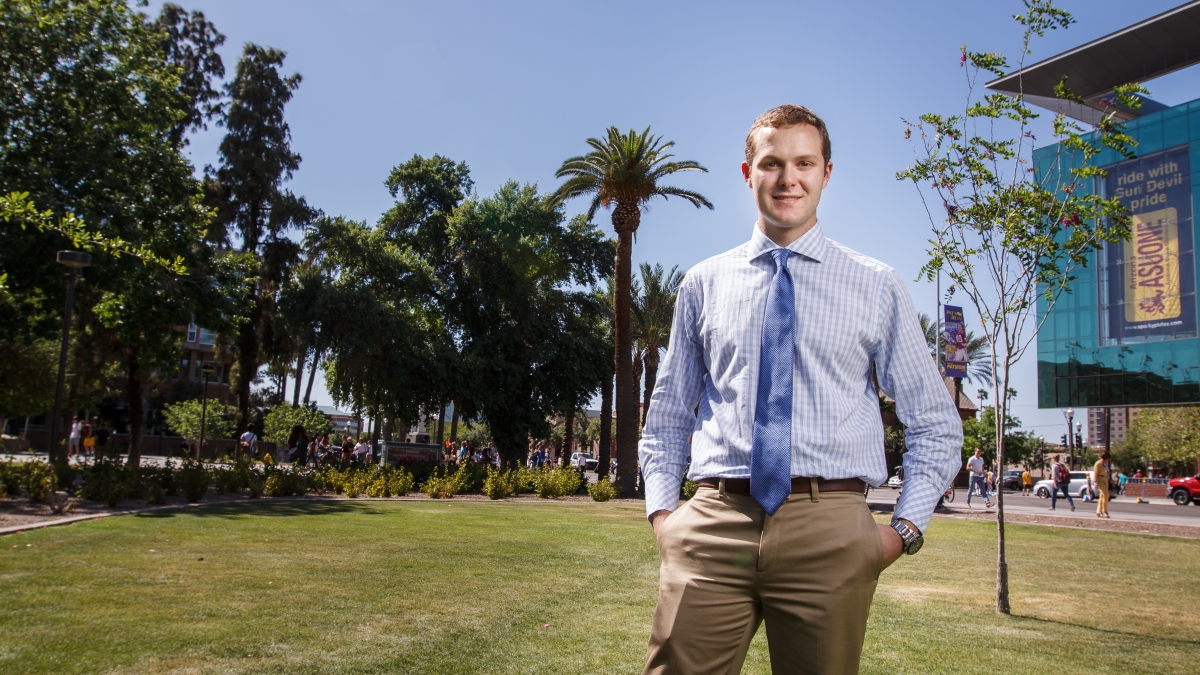Kinesiology major receives Barrett Honors College Outstanding Graduate Award

Andrew Albert always wanted to be a competitive cyclist.
Albert, a kinesiology major and the recipient of this year’s Barrett Honors College Outstanding Graduate Award, said his interest in the sport was sparked after competing in a triathlon during his junior year in high school.
“The mechanics of cycling and the way a bike becomes an extension of human operability fascinated me,” Albert said. “I enjoyed it immensely and it was then and there that I decided to pursue the sport competitively.”
After finishing high school, Albert, a resident of Chandler, Ariz., started applying to colleges in the state, as well as in California and Colorado. He was accepted to several schools, including the University of Arizona and the University of Colorado in Boulder, but decided to join Barrett to take advantage of the breadth of academic and extracurricular opportunities available at ASU and to remain close to his Scottsdale-based cycling coach.
“At the time, I was focused on building my cycling career,” he said. “Soon, I realized that the competitive cycling lifestyle and living out of a suitcase wasn’t for me. I quickly turned my attention to exercise and kinesiology – subjects that matched my interests.”
In his sophomore year, Albert took a class offered by Shannon Ringenbach, an associate professor of kinesiology and the director of ASU’s Sensorimotor Development Research Lab, who was launching an innovative research project examining the effects of Assisted Cycling Therapy (ACT) on the motor, clinical and cognitive functions in adolescents with Down syndrome (DS). Albert was intrigued and signed up as a research assistant.
“Andrew was the perfect fit for the study as he is a cycling expert,” Ringenbach said. “He hit the ground running, learned the ACT technology, collected data for 10 adolescents with Down syndrome and defended his honors thesis on the topic his junior year.”
Pilot data from Albert’s honors thesis helped the project win a grant from the National Institute of Child Health and Human Development in 2012. Ringenbach, who’s also his thesis director, said Albert has since become the lead research assistant for the study and has collected data for 30 individuals with DS. He has also helped with recruitment efforts, scheduling, equipment maintenance and training of other graduate and undergraduate students.
“This study would not have been possible without him,” she said.
Albert, 22, has three peer-reviewed journal papers in press, two under review and has co-authored a book chapter titled “Assisted Cycle Therapy (ACT): Implications for Improvements in Motor Control.”
In addition to his academic achievements, Albert also works with special needs populations in the Phoenix area, volunteers at a local nursing facility, serves as a medical team captain for several area marathons and cycling events, coaches youth cycling teams, presides over ASU's American Medical Student Association chapter and has founded a Math and Science Club at Hancock Elementary School in Chandler that engages elementary school children in hands-on learning activities to inspire their interest in the STEM fields.
Still, Albert said he was surprised to learn that he’d won Barrett’s Outstanding Graduate Award.
“Barrett Honors College is full of students who I think are smarter than I am,” Albert explained. “I’m grateful for the award. It’s an honor and a privilege.”
Mark Jacobs, the vice provost and dean of Barrett Honors College, says the award is well deserved.
“Andrew Albert epitomizes the coupling of ability and opportunity that is possible at ASU and Barrett Honors College,” Jacobs says. “He has applied his very high capability to a stunning number of programs and causes.”
Albert said much of his success can be attributed to ASU's size.
“Resources and opportunities for students seem unlimited here," Albert says. "Professors are conducting research on any and every topic one can think of. I was encouraged to interact with my peers and faculty members that led to relationships I wouldn’t have formed otherwise.”
Albert plans to study medicine after graduation and will be taking the Medical College Admission Test (MCAT) in a few weeks.
“ASU has prepared me well for a medical career,” he said. “I’ve been involved in research studies, grant-writing, community projects and on-campus organizations that have helped shape my perspective of the role I hope to play in the world around me.”
Albert said he hasn’t zeroed in on a specialization yet, although he’s leaning toward developmental pediatrics or sports medicine. He said he looks forward to the next chapter of his life.
“My first med school acceptance letter would make me very happy as will graduation,” Albert said. “I’ve enjoyed my time at ASU, and I feel equipped and ready to move onward and upward.”